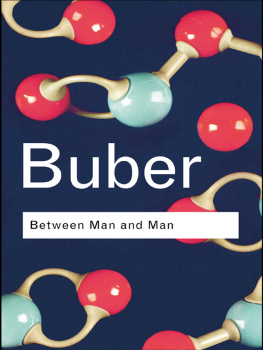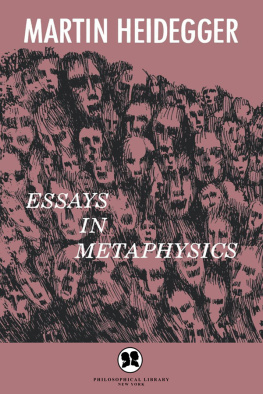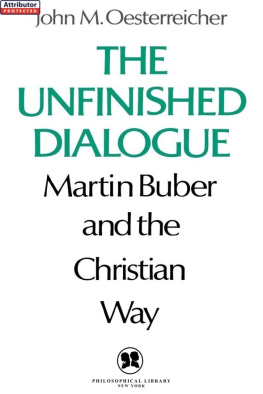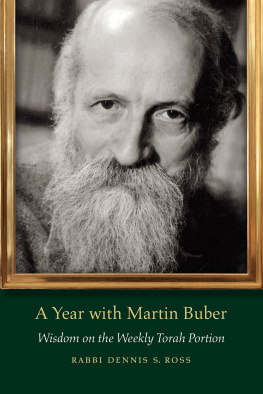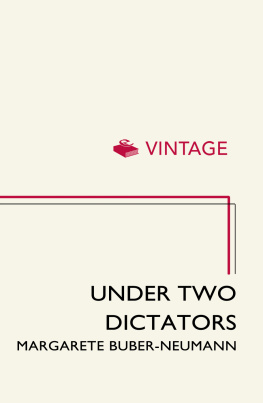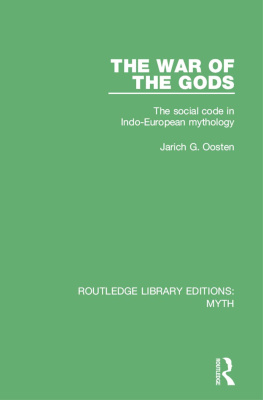Buber Martin - Between Man and Man
Here you can read online Buber Martin - Between Man and Man full text of the book (entire story) in english for free. Download pdf and epub, get meaning, cover and reviews about this ebook. City: London;New York, year: 2002;2011, publisher: Routledge, genre: Science. Description of the work, (preface) as well as reviews are available. Best literature library LitArk.com created for fans of good reading and offers a wide selection of genres:
Romance novel
Science fiction
Adventure
Detective
Science
History
Home and family
Prose
Art
Politics
Computer
Non-fiction
Religion
Business
Children
Humor
Choose a favorite category and find really read worthwhile books. Enjoy immersion in the world of imagination, feel the emotions of the characters or learn something new for yourself, make an fascinating discovery.
- Book:Between Man and Man
- Author:
- Publisher:Routledge
- Genre:
- Year:2002;2011
- City:London;New York
- Rating:4 / 5
- Favourites:Add to favourites
- Your mark:
- 80
- 1
- 2
- 3
- 4
- 5
Between Man and Man: summary, description and annotation
We offer to read an annotation, description, summary or preface (depends on what the author of the book "Between Man and Man" wrote himself). If you haven't found the necessary information about the book — write in the comments, we will try to find it.
Between Man and Man — read online for free the complete book (whole text) full work
Below is the text of the book, divided by pages. System saving the place of the last page read, allows you to conveniently read the book "Between Man and Man" online for free, without having to search again every time where you left off. Put a bookmark, and you can go to the page where you finished reading at any time.
Font size:
Interval:
Bookmark:
Martin Buber is one of the creative minds of our age.
Hans Urs von Balthasar
Martin Buber, mystic Zionist leader, Bible translator, is also one of the outstanding religious philosophers of our time... This dynamic book must speak for itself, by means of itself, as an existential dialogue between author and reader... The immeasurable delicacy of touch, the deep humility and self-effacement before the truth, characterize the fine and realistically practical writing on education.
Time and Tide
Bubers insight is revolutionary. It breaks through the conventions, and breaks down the normal lines of demarcation in modern thought.
Ronald Gregor Smith
Stimulating and moving.
The Times Educational Supplement
This is one of the best collections of Bubers essays about dialogue and the dialogical principle.
Dan Avnon
The address to the individual is inescapable... Spirit is not something that is, but something that happens. To learn this we must enter into lifes spiritual experiences, not merely look into them. Spirit is nourished by unity of life, and unity with the world.
The Times Literary Supplement
The translator has pleasure in acknowledging the generous help of Mr. Kurt Emmerich, who gave unstintingly of his time and knowledge in the earlier stages of the translation, and of the author himself, who read not only the entire MS. but also the proofs, and made countless valuable suggestions.

First published 1947
by Routledge & Kegan Paul
First published in Routledge Classics 2002
by Routledge
11 New Fetter Lane, London EC4P 4EE
29 West 35th Street, New York, NY 10001
Routledge is an imprint of the Taylor  Francis Group
Francis Group
This edition published in the Taylor & Francis e-Library, 2004.
1947, 1961, 1965, 1993 Estate of Martin Buber
Introduction Maurice Friedman 1965, 2002
All rights reserved. No part of this book may be reprinted or reproduced or utilised in any form or by any electronic, mechanical, or other means, now known or hereafter invented, including photocopying and recording, or in any information storage or retrieval system, without permission in writing from the publishers.
British Library Cataloguing in Publication Data
A catalogue record for this book is available from the British Library
Library of Congress Cataloging in Publication Data
A catalog record for this book has been requested
ISBN 0-203-22009-9 Master e-book ISBN
ISBN 0-203-27512-8 (Adobe eReader Format)
ISBN 0-415-27826-0 (hbk)
ISBN 0-415-27827-9 (pbk)
The five works which I have brought together for English readers in this volume have arisen in connexion with my little book I and Thou (1923), as filling out and applying what was said there, with particular regard to the needs of our time.
The first of these works, Dialogue (1929) proceeded from the desire to clarify the dialogical principle presented in I and Thou, to illustrate it and to make precise its relation to essential spheres of life.
The Question to the Single One, which contains some political inferences, is the elaboration of an address which I gave to the students of the three German-Swiss Universities at the close of 1933. The book appeared in Germany in 1936astonishingly, since it attacks the life-basis of totalitarianism. The fact that it could be published with impunity is certainly to be explained from its not having been understood by the appropriate authorities.
There follow two addresses on major problems of education, the first given at the Third International Educational Conference at Heidelberg in 1925, the second at the National Conference of Jewish Teachers of Palestine at Tel-Aviv in 1939. Both addresses treat of the significance of the dialogical principle in the sphere of education, the first for its groundwork, the second for its most important task.
The volume concludes with my inaugural course of lectures as Professor of Social Philosophy at the Hebrew University of Jerusalem (1938). This course shows, in the unfolding of the question about the essence of man, that it is by beginning neither with the individual nor with the collectivity, but only with the reality of the mutual relation between man and man, that this essence can be grasped.
MARTIN BUBER
Jerusalem
English edition (R. & R. Clark, Edinburgh), 1937, 3rd impression, 1945.
by Maurice Friedman
When Dag Hammarskjlds plane crashed in Northern Rhodesia, the Secretary General of the United Nations had with him the manuscript of a translation that he was making of Martin Bubers classic work I and Thou. It is because of this book and the philosophy of dialogue that it presents that Dag Hammarskjld repeatedly nominated Martin Buber for a Nobel Prize in literature. I and Thou is recognized today as among the handful of writings that the twentieth century will bequeath to the centuries to come, but for many readers this compact and poetic little book needs an introduction to be properly understood and applications to concrete fields of human experience to be properly appreciated. More than any other work of Bubers, Between Man and Man provides this introduction and these applications. The opening essay on Dialogue, in particular, with its contrast between dialogue and monologue and its personal anecdotes, represents the best introduction to Bubers philosophy of dialogue, while the other essays in this volume show its applications for such concerns as religious ethics, politics, social philosophy, marriage, education, psychology, art, the development of character, and philosophical anthropology, or the study of the problem of man.
In his Foreword to Between Man and Man, Martin Buber states that the five works brought together in this volume fill out and apply what was said in I and Thou. Dialogue clarifies the dialogical principle presented in I and Thou, illustrates it, and makes precise its relation to essential spheres of life. The terminology and scope of I and Thou are different from those of Dialogue, however. In I and Thou, Buber contrasts mans two primary attitudes the two ways in which he approaches existence. One of these is the I-Thou relationship, the other the I-It. The difference between these two relationships is not the nature of the object to which one relates, as is often thought. Not every relation between persons is an I-Thou one, nor is every relation with an animal or thing an I-It. The difference, rather, is in the relationship itself. I-Thou is a relationship of openness, directness, mutuality, and presence. It may be between man and man, but it may also take place with a tree, a cat, a fragment of mica, a work of artand through all of these with God, the eternal Thou in whom the parallel lines of relations meet. I-It, in contrast, is the typical subject-object relationship in which one knows and uses other persons or things without allowing them to exist for oneself in their uniqueness: The tree that I meet is not a Thou before I meet it. It harbors no hidden personality that winks at me as I pass by. Yet if I meet it in its uniqueness, letting it have its impact on me without comparing it with other trees or analyzing the type of leaf or wood or calculating the amount of firewood I may get out of it, then I may speak of an I-Thou relationship with it. The person that I meet is, by courtesy of our language and our attitudes, a person before I meet him. But he is not yet a Thou for me until I step into elemental relationship with him, and if I do not step into this relationship, even the politest forms of address do not prevent his remaining for me an It. I cannot, of course, produce an I-Thou relationship by my own action and will, for it is really mutual only when the other comes to meet me as I him. But I can prevent such a relationship from coming into being if I am not ready to respond or if I attempt to respond with anything less than my whole being insofar as my resources in this particular situation allow.
Font size:
Interval:
Bookmark:
Similar books «Between Man and Man»
Look at similar books to Between Man and Man. We have selected literature similar in name and meaning in the hope of providing readers with more options to find new, interesting, not yet read works.
Discussion, reviews of the book Between Man and Man and just readers' own opinions. Leave your comments, write what you think about the work, its meaning or the main characters. Specify what exactly you liked and what you didn't like, and why you think so.

